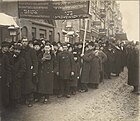Henryk Ehrlich
Henryk Ehrlich | |
|---|---|
 | |
| Born | 1882 Lublin, Poland |
| Died | 15 May 1942 Samara, Soviet Union |
| Part of a series on |
| Bundism |
|---|
 |
| 1890s to World War I |
|
| Interwar years and World War II |
| After 1945 |
|
| People |
| Press |
| Songs |
| Associated organisations |
| Splinter groups |
|
| Categories |
Henryk Ehrlich
Social-democratic politics
Ehrlich became an activist in the
Interwar Polish and Jewish communal politics
In 1921 Ehrlich was named a co-editor of the Warsaw
World War II
After the
Imprisonment and death
The Soviet imprisonment of two prominent socialist activists and leaders of the Second International caused a wave of protests among socialist circles in the West.[6] Eleanor Roosevelt and Albert Einstein made direct appeals to Stalin for their release.[3] However, Soviet authorities remained quiet throughout 1942. On 23 February 1943, and only after the Soviet victory at Stalingrad, the Soviet ambassador in Washington, Maxim Litvinov, wrote to the President of the American Federation of Labor, William Green, telling him that Ehrlich and Alter had been executed[4] on Stalin's orders.[7]
According to some sources Ehrlich, unlike Alter, was never executed, because he managed to commit suicide[8] by hanging himself from the bars of his prison window. Other sources state that together with Alter, he was shot in December 1942. As late as February 1943, letters from "Henryk Wiktor" (first names of Ehrlich and Alter) were being circulated in the Warsaw Ghetto.[9]
Rehabilitation
On 8 February 1991, Victor Ehrlich, Henryk Ehrlich's son, was informed that according to a decree passed under
While the exact place where he was buried is unknown, a
Family
His father-in-law was historian Simon Dubnow.[12]
See also
- List of Poles
Notes and references
- ISBN 978-0-8047-0345-1.
- ISBN 965-223-962-3.
- ^ ISBN 978-0-8369-2077-2.
- ^ a b c Anonymous (1947). The Dark Side of the Moon. New York: Charles Scribner's Sons. p. 235. Retrieved 16 September 2023.
- ^ ISBN 0-253-33811-5.
- ^ "Labor: Carey on Communism", Time, 12 April 1943.
- ISBN 0-300-04494-1.
- ISBN 978-0-19-535188-0.
- ^ Charles Kotkowsky (2000) "Memoirs of A Survivor", Montreal Institute for Genocide and Human Rights Studies, originally published by Concordia University Chair in Canadian Jewish Studies.
- ^ ISBN 978-0-8101-2351-9.
- ^ Lucan Way (1 March 1993) "Exhuming the Buried Past; in the K.G.B. Files", The Nation, Vol. 256.
- ISBN 978-0-8276-0321-9.
External links
- Albert Glotzer, "Murder as a Political Weapon", The New International, Vol. IX No. 3, March 1943, pp. 69–70.
- Majer Bogdanski, "Purged from history", Jewish Socialist, No. 24, October–December 1991.
